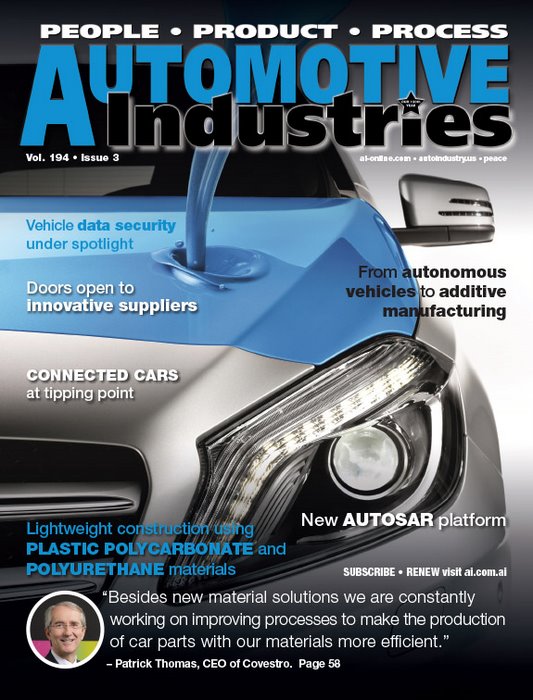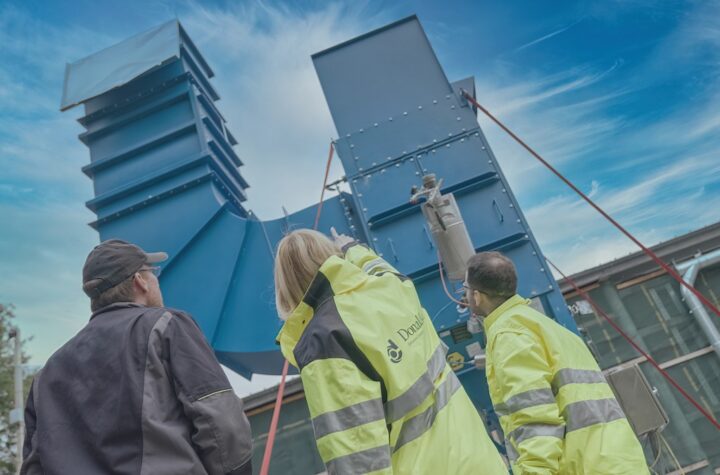Plastics now account for about 15% of materials used in a mid-sized car and this percentage is growing as car manufacturers hunt for ways to reduce weight of vehicles to improve fuel economy.
Covestro – previously Bayer MaterialScience – is a leading supplier of high-value polymers and solutions for various industries including automotive. In September 2015, Covestro became economically and legally independent from its parent company Bayer and one month later was listed at the German stock exchange in what was the biggest IPO in Germany in 2015. Covestro is headed by Patrick Thomas, who was also CEO of Bayer MaterialScience. It is estimated that between 2000 and 2050, the number of cars on the world’s roads could quadruple to 2.7 billion. “This represents a real challenge for climate protection and the conservation of scarce raw materials. We need lightweight cars with excellent fuel economy and low emissions. Innovative materials and solutions from Covestro are of great help in this respect. They also make a key contribution to eco-friendly electric mobility and pave the way for stylish design that gives vehicles their own unique personality,” says the company.
The company’s high-performance plastic polycarbonate and versatile polyurethanes provide lightweight construction solutions throughout the car. These materials can be used for applications such as roofs and windows, headlights and the rear hatch. “This is good for the environment, because less weight means less fuel. The lean design is also vital for electric mobility, where the considerable weight of the batteries needs to be compensated. Covestro supplies material solutions for the batteries themselves and the stations used to recharge them. The company’s innovative products and processes do more than make car production efficient and the resultant vehicles economical, though. Polycarbonate and polyurethane-based coatings – paints, finishes and films – also help give vehicles their own unique design,” says the company.
Covestro’s polyurethane foams which are used in everything from seats, to the roof and trunk, help EVs keep their weight down. Similarly, the company’s polycarbonate is used for automotive glazing and headlights in EVs as it is 50% lighter than glass.
Automotive Industries (AI) asked Thomas how he, as chairman of the newly formed corporate entity, sees Covestro’s development over the next few years.
Thomas: It is a great opportunity, not just for me but for all of us. We will shape this new company according to our new vision and values. We want to make the world a brighter place – to preserve our planet’s resources and the environment, promote society and create additional value. We want to achieve this with our high-value materials, efficient processes and last but not least skilled and inspired employees across the globe who live up to our unique set of values: to be curious, courageous and colorful in everything they do.
AI: How does Covestro help make vehicles “lightweight”?
Thomas: Polycarbonates and polyurethanes, which have been invented by our company, can be found in a wide range of applications for the interior and exterior of cars. Our polyurethane raw materials for example are used to produce flexible foams for car seats, while rigid foam is well suited to insulate vehicles against heat or cold and noise. Polycarbonate is a highly transparent, break resistant, durable high tech plastic that can be freely designed and is much lighter than glass or metal. It is already used in head lamps, rear lamps, glazing, rear spoilers and radiator grilles – with more application solutions being possible. We’ve already made an entire rear hatch from polycarbonate.
AI: How will future, eco-friendly cars, impact or change Covestro’s R&D strategy?
Thomas: We think that plastics are a key element of eco-friendly cars. Our materials help cars in becoming lighter and thus need less fuel. As a next step we are working on lightweight thermo formable composites based on polycarbonates. Looking for new solutions with existing materials is one pillar of our R&D strategy. Developing new applications, technologies or processes for eco-friendly cars is already part of our R&D.
AI: What, in your opinion, are the future materials for e-mobility?
Thomas: E-cars will take over sooner or later. Current challenges are high manufacturing costs and sales prices, insufficient batteries, low range and missing infrastructure. To extend the range, a car needs to be lighter and be constructed in a smarter way in order to save energy. Polyurethane foams in seats, roofs and the trunk can help insulate the cockpit and reduce the demand for heating and cooling. Polycarbonate in glazing or structural parts can save a lot of weight. E-Mobility will not work without plastics, and we are prepared for that.
AI: How has Covestro’s innovation and leadership in providing intelligent, lightweight material solutions across a wide range of automotive applications been enhanced in the recent past?
Thomas: We are constantly developing new solutions. Most recently we developed a polyurethane composite system that could serve as structural vehicle parts as well as coatings that are based on 70% bio-based material. Besides new material solutions we are constantly working on improving processes to make the production of car parts with our materials more efficient. For example, we developed a car coating that hardens under lower temperature and thus can be hardened with waste heat.
AI: What have been some of the immediate changes that have occurred after the September renaming to Covestro from Bayer MaterialScience? Has there been a shift in corporate strategy and if so, what has been the change?
Thomas: Being an independent company listed on the stock exchange puts Covestro in an even better position than before. It enables Covestro to pursue its business goals and deploy its strengths more quickly, effectively and with greater flexibility. We can now optimize our structures as a pure polymers producer and become an even stronger competitor in the global arena. Covestro has a clear strategy which it will execute. The main purpose is to achieve further profitable growth. This should be supported by expected favorable dynamics of our core markets and industries which are expected to grow faster than the world economy in the years to come. The basis for our future success is continuous innovation, and we embrace sustainability in everything we do














































 Automatic transmissions contribute to fuel economy
Automatic transmissions contribute to fuel economy Bionic design and additive manufacturing go mainstream
Bionic design and additive manufacturing go mainstream New AUTOSAR adaptive platform on its way
New AUTOSAR adaptive platform on its way Aluminum from Novelis Lightens Cadillac CT6
Aluminum from Novelis Lightens Cadillac CT6 Real-time health tool ensures development projects are under budget and on time
Real-time health tool ensures development projects are under budget and on time Managing Big Data to make cities more competitive
Managing Big Data to make cities more competitive


